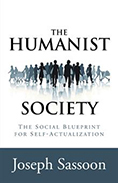
 |
In order for individuals and societies to reach their highest potential, it is necessary to create a new world order that embraces the democratic ideals of humanist values, posits Sassoon in his second installation of a trilogy. But Sassoon does not argue for humanism in the conventional sense. That is, he does not suggest that a humanist society is the polar opposite of a religious society, but rather that a marriage of the best of both worlds is not only possible, but necessary.
At first blush, Sassoon's theories in favor of humanistic world federalism seem to be overly idealistic. Any learned individual knows all too well that utopian societies are simply impossible if one person's definition of utopia is different from the next person's definition. But readers who give Sassoon the opportunity to explain himself further are treated to a well-developed discussion of human nature. Sassoon does not make the mistake of arguing in favor of human sameness; after all, it is our vast differences and our capacity for free will that makes us human.
Delving further into this book, the reader will explore all sorts of worldviews, from Confucianism and Communism to Judaism and Islam. Sassoon does not limit his range. He touches on everything from the Nazis during World War II to the terrorists who perpetrated the 9/11 attacks. He explores the effect of humanism on economic systems, education, and science. Sassoon does not limit himself to philosophical musings alone, but also proposes practical means of accomplishing his goal of spreading the message of humanism to, namely, the Internet. Although many of Sassoon's arguments are thought-provoking, some of them do appear to point in favor of authoritarianism, which is, confusingly, the very evil that Sassoon is against.